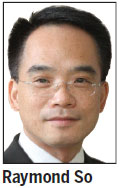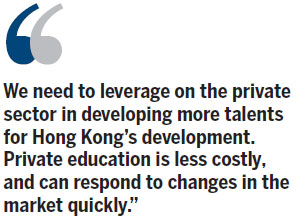Higher education key to knowledge-based economy
Updated: 2014-04-24 05:50
By Raymond So(HK Edition)
|
|||||||
It is clear that Hong Kong is gearing towards a knowledge-based economy. A distinctive feature of it is that individual success is determined more by expertise than elbow grease. Such an economy feeds on people who have attained a university education - be it locally or overseas.
London is a prime example of the success of a knowledge-based economy. The city is a magnet for talents not just from the UK but all over the world. This confluence of talent has enabled London to retain its historic position as a global hub in finance and banking but more recently also in fashion design, culture and the arts.
London's success is facilitated by the high education standard of Britons in general and Londoners in particular. This ready pool of great talent across its workforce allows the city to provide high quality results in many fields, further enhancing London's enviable international reputation.

This being the case, what is a better model for Hong Kong to emulate than London? And the way to do so is to significantly increase our investment in higher education to produce the talents required of a knowledge-based economy.
But there is one important caveat to this rosy scenario - we must rid ourselves of the hang-up many locals have over a university graduate's social status.
In the Western economies, it is not uncommon for college graduates to find themselves jobs that do not require a college degree. This seems to be a waste of education resources. However, when we examine the performance of these employees, in most cases they do a better job and provide higher-quality outputs than their less-qualified colleagues, proving that education does make a difference.
Our problem is with the Chinese traditional view that sees higher education just as stepping stone towards high social status, plus a secure job with a high salary. The fact is that the entire society benefits from people's higher education in general because of the cumulative effect and the interactions of a better-trained workforce, regardless of their status or earning power.
In short, we must focus on increasing opportunities for higher education, which regrettably is very costly in Hong Kong. So why is it that our university system is so expensive?
The government needs to subsidize every university student over HK$200,000 per year. And if we add the tuition fee of HK$42,100, and other outgoings, the average cost per student approaches HK$300,000 per year. Given this high cost in higher education, we must be selective in identifying the most promising student candidates for government-funded universities.

All Hong Kong government-funded universities are geared towards research because their research outputs can secure a higher international ranking for them, giving them greater prestige and image. If a university simply focused on teaching, it would lose its position in the international arena. Hence, all the public universities in Hong Kong will attach considerable importance to rankings, devoting much of their resources to producing internationally recognized research outputs. Clearly such a system cannot match the society's needs for a larger high-quality workforce to ensure our economy maintains its vitality.
My view is that we need to leverage on the private sector in developing more talents for Hong Kong's development. Private education is less costly, and can respond to changes in the market quickly. The sad thing, however, is that there is a misconception about private education. Graduates from private education institutions are often labeled as second tiers. Clearly this is not good for the development of a better educated workforce, and to Hong Kong as a knowledge-based economy.
The number of university places at public universities can remain the same, since it is difficult to increase the numbers given the high per-unit costs. But more university places can be contributed by private tertiary educational institutes. The general public should also be taught that an overall well-developed workforce is good for the whole society, though individuals may not have direct benefit as payoffs to particular people require individual merits. In a knowledge-based economy, higher education is a necessary but by itself not sufficient condition. The general public should also accept the fact that there will be jobs occupied by over-qualified people. This change in attitude, nevertheless, will take years. Some countries already show signs of this trend, and surely Hong Kong should follow suit.
The author is dean of School of Business at Hang Seng Management College.
(HK Edition 04/24/2014 page9)